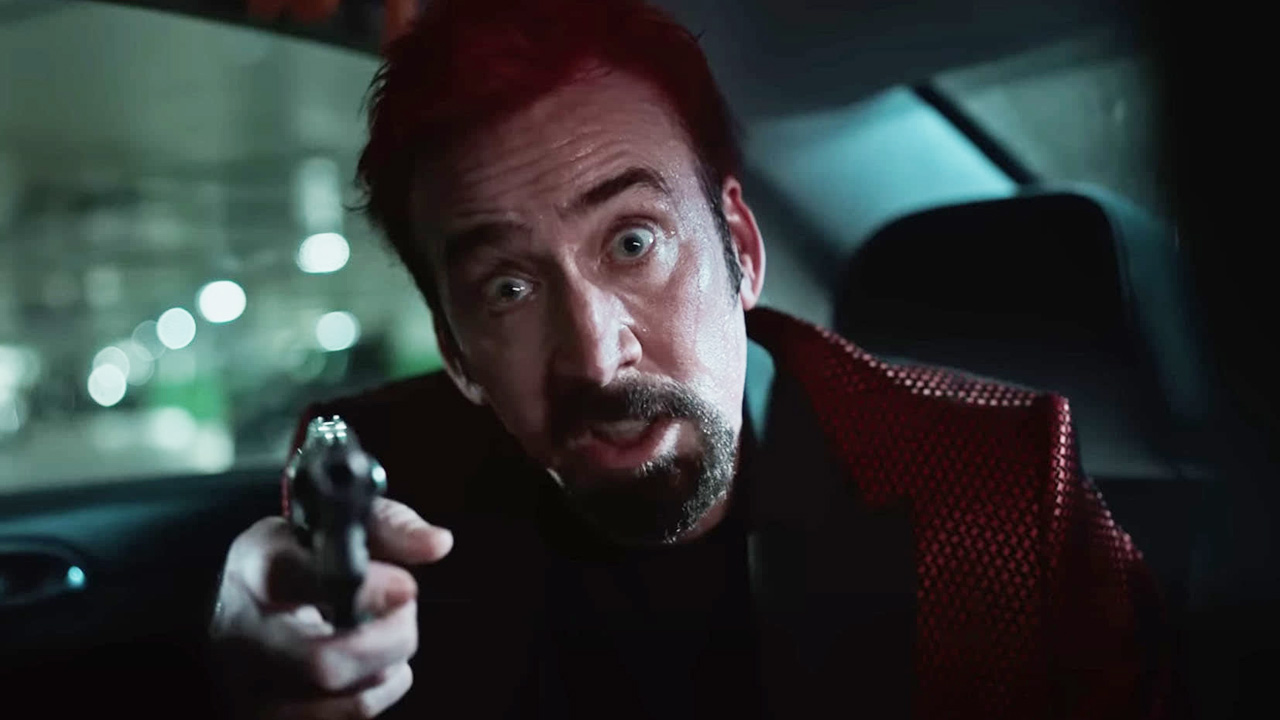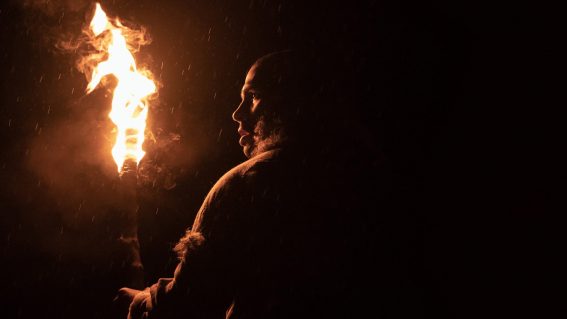Sympathy for the Devil delivers more than enough Nic Cage carnage to satisfy fans

A goateed Nic Cage with red hair, a gun, and a bunch of strange demands. What could go wrong? Luke Buckmaster dives into Cage’s latest thriller: a pared-back hostage drama set in Sin City.
Sympathy for the Devil (2023)
Watching Nicolas Cage’s latest thriller Sympathy for the Devil, I nervously anticipated the moment Mick Jagger would hit the soundtrack to reintroduce his socialite version of the devil, famously a “man of wealth and taste.” This film couldn’t be that on the nose, could it? Put it this way. When an armed and goateed Cage bundles himself into a car—spelling trouble for Joel Kinnaman’s unsuspecting everyman who’s behind the wheel—he’s wearing a dark red blazer with matching dark red hair. Because red, because Satan? Neither of the lead characters are named, further fuelling the possibility that Cage might be embodying the dude downstairs, popping up to cause some carnage: killing a Tsar and his ministers, laying traps for troubadours…
Given the actor’s richly eclectic oeuvre encompasses many otherworldly characters, including several with biblical connections—such as a pilot navigating the Rapture and a stuntman who sells his soul to the devil—no-one would be surprised if Cage went the full Al Pacino from The Devil’s Advocate, spitting fire-and-brimstone monologues with eyes demonically blazing, smoke coming out of his ears. But this film—and his performance—is subtler than that. Don’t get me wrong: Cage is unhinged and off his trolley (we wouldn’t want it any other way) but keeps eerily calm, or at least eerily repressed, for a lot of it, concealing his psychotic insides and biding his time.
So does director Yuval Adler. The mood of the film, and Joel Kinnaman’s driver, is relaxed when it begins despite the drama occurring on an important day for this nondescript looking man—his wife in labor and about to give birth. He assures her he’ll be there, but it’s a promise he can’t keep. When he pulls into the hospital carpark Cage jumps into the back of his car, looking and sounding like a hack magician, asking him to “pick a card” before demanding he leave the hospital and hit the road. When Kinnaman mentions that he has “a family emergency,” his captor snaps back: “I’m your family emergency now.”
En route to an unknown destination, Kinnaman begins monologuing—but nuh-uh, writer Luke Paradise knows that’s not how this works. You don’t out-monologue the Cage. So the red-haired devil interjects with a counter-monologue, one of those heard-it-before spiels, beginning: “now you’re gonna talk about your family…about how much you love them, with all your heart and all your goddamn soul. Isn’t that a bit of a cliché?” Another cliché might be to describe Sympathy for the Devil as a “cat and mouse” thriller. Productions like this attract such a label because they pivot around tension between the overtly powerful (Cage) and the vulnerable but potentially cunning and evasive (Kinnaman).
The film’s based in and around Las Vegas but avoids the “bright light city gonna set my soul on fire” thing. This is a pedestrian, level-headed depiction of Sin City and its outskirts, more concrete playground than casino and clubhouse. It might’ve benefited from a more evocative sense of location, perhaps modelling Michael Mann’s more invigoratingly paced Collateral—another nighttime CBD thriller featuring a driver (Jamie Foxx’s cabbie) attempting to fend off an unwanted passenger (Tom Cruise’s steely assassin) with a gun and a plan. But the general lack of locational flair accentuates its few interesting settings, including the aforementioned diner, its sparkling neon signs a kind of electric oasis, or visual signifier of impending action.
Much of Cage’s seething performance in this pared-back film, which he almost single-handedly makes entertaining, is a tantalising pregnant pause. You know he’s going to lose his shit but you don’t know when or why. It’s an ice-cool performance and the kind of character one might describe as having a death wish. But this guy doesn’t care; he doesn’t seem to wish for anything.
The film’s pièce de résistance of whole-hog Cageness has him singing, strutting and dancing to Alicia Bridge’s disco classic I Love the Nightlife. Cage going berserk plus iconic song equals memeable spectacle, as Mom and Dad demonstrated when he belted out ‘The Hokey Pokey’ while smashing a pool table with a sledgehammer. You don’t need special effects in a Nicolas Cage movie. He is the special effect. And in Sympathy for the Devil he delivers more than enough to satisfy devotees.
















